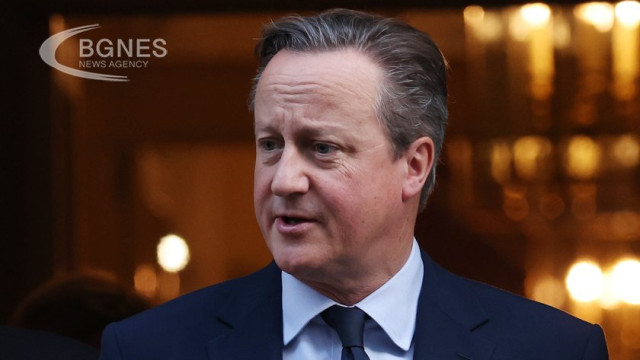David Cameron said "heat and anger" had disappeared from relations between the UK and the EU as he spoke in detail about the UK's global position after Brexit for the first time since becoming foreign secretary, the Guardian reported.
Cameron told peers on the Lords European Affairs Committee that relations between London and Brussels were better than they had been for some time, thanks in part to the Windsor Framework agreed by the prime minister, Rishi Sunak.
Cameron's comments marked his most detailed assessment yet of Britain's place in the world since he stepped down as prime minister in 2016, and contrasted with predictions he made during the Brexit campaign when he warned that leaving The EU will mean "withdrawal from the world".
"A lot of the heat and anger is about relationships," he told committee members. "It's much more functional now, and I think it's working well," Cameron said.
"We have decided not to be a member of the EU, but we can be friends, neighbors and partners. We are making this partnership work as well as possible," added the UK's top diplomat.
He was careful not to criticize Britain's exit from the EU during his first committee hearing since Sunak appointed him foreign secretary last month, despite leading the campaign to prevent Brexit seven years ago.
He spoke of the benefits of leaving the EU, which he said had allowed Britain to be "big enough to matter but small enough to be flexible". One of those advantages, he said, is the ability to strike trade pacts like the Comprehensive and Progressive Agreement for Trans-Pacific Partnership with Canada, Japan and nine other countries.
"There is no point in leaving and not taking advantage of leaving," the top diplomat said.
However, Cameron warned of the risk of too much deviation from European standards, which could deprive Britain of access to the continent's markets.
"Let's not deviate for the sake of deviation," he said, referring specifically to the need to maintain sufficiently tight controls on data protection to be able to trade with the EU. "But if there are things we can do to cut red tape, to help businesses, to help our entrepreneurs, let's do those things."
Cameron also called on US and EU politicians to accept new support packages for Ukraine, warning that failure to do so would amount to a "Christmas present for Vladimir Putin".
Republicans in Congress are blocking a $61 billion military aid package for Ukraine while demanding concessions on immigration policy, and Hungarian Prime Minister Viktor Orbán is blocking a European aid plan in Brussels.
"The best Christmas present we could give the Ukrainians is to accept both packages," Cameron said.
On 14 December, the British Foreign Secretary announced that the UK would ban "extremist" Israeli settlers from entering the UK, calling recent settler violence against Palestinian civilians in the West Bank "unacceptable".
He later told the committee that he continued to support the two-state solution, despite recent comments by Tzipi Hotoveli, Israel's ambassador to the United Kingdom, in which she opposed the creation of a Palestinian state./BGNES







